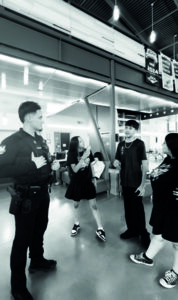CAN TENTH GRADERS meaningfully impact sustainability challenges? My year learning about Xplorlabs and ASU’s action-oriented pedagogies proves they can! By guiding students through the complex life cycle of lithium-ion batteries — from extraction to e-waste — we moved beyond theoretical discussions into genuine, consequential community actions.
Why action-oriented pedagogy?
Traditional teaching often stops at understanding and assessment; AOP pushes students toward active change-making. During my yearlong fellowship, I chose to connect climate education to safety science, and students explored the real-world implications of climate challenges like lithium- ion battery production, use, and disposal. Introducing roles — such as innovators, advocates, and solution stewards — empowered students to envision sustainable futures, deeply understand multiple perspectives, and undertake authentic actions in their community.
Implementing the action campaign
Our campaigns unfolded in several stages. My Earth science class was a perfect opportunity to implement the Xplorlabs Extraction to E-Waste resources and pedagogies modeled during the Fellowship Summit since the environmental impacts of the lithium-ion supply chain were evident in students’ communities. Initially, students explored local geological processes, such as soil stability, to grasp the environmental impacts of mineral extraction.
Building from soil stability tests and mineral research projects, students transitioned to investigating lithium-ion batteries, focusing on the supply chain of batteries from extraction to e-waste.

Students sharing information on campus
about lithium-ion battery disposal.
Students identified sustainability challenges within each stage of the battery supply chain, considering ethical implications and community impacts. They adopted roles in their working groups to foster multiple perspectives — working collaboratively to plan advocacy campaigns targeting tangible community outcomes, thus creating real positive consequences beyond the classroom.
Student advocacy in action
Students facilitated Socratic discussions and produced engaging videos and infographics highlighting the dangers and proper disposal methods of lithium-ion batteries. They educated peers through dynamic digital campaigns that reached the broader school community.
Volt for Change
Students developed visually impactful social media campaigns and successfully initiated a permanent e-waste disposal program on campus. Students transitioned from artists creating compelling visuals to implementers who installed and managed the disposal bins, leaving an enduring legacy at the school.
ChargeCore
Students conducted interactive STEM workshops to educate peers about the environmental and social impacts of battery production and disposal. This proactive approach empowered students to educate others, spreading awareness through direct peer-to-peer interactions and educational pamphlets distributed schoolwide.
Implementing AOP wasn’t without challenges. Initially, students struggled with the complexity of sustainability issues and identifying tangible actions. Often, students questioned how they could make any impact since this problem is a global issue. Sharing other students’ stories helped them see how making small changes in their community could make a world of difference.
Also, with such a large-scale project, some students struggled without a clear destination in mind; however, scaffolded assignments like the soil excavation and mineral research projects within the Xplorlabs Science of Extraction to E-Waste pathway prepared students for deeper engagement. Student reflections revealed increased confidence and a profound realization of their ability to enact change, confirming the power of connecting classroom learning to authentic community action.
Educators, Xplore action-oriented pedagogy!
Implementing Xplorlabs resources and action-oriented pedagogy transformed our classroom, empowering students to not only learn facts and state standards about climate and sustainability issues but to actively participate in addressing them.
;)


